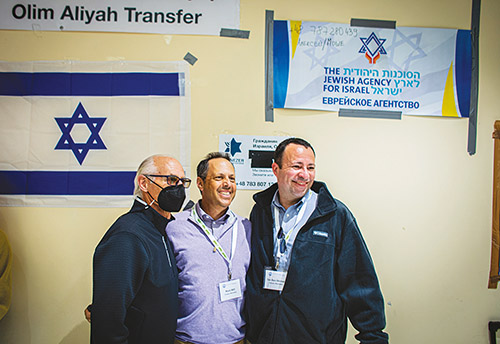

When leaders of the Jewish Federation of Greater MetroWest went to view the humanitarian crisis unfolding as desperate refugees streamed across the border from Ukraine into Poland, they witnessed some of the worst and best of humanity.
“We saw women and children coming with literally nothing,” said Federation CEO Dov Ben-Shimon, who went on the March 14-16 mission with the Jewish Federations of North America (JFNA), in describing the traumatized refugees he witnessed.
However, during a Zoom program on March 18 he also said he witnessed an “incredible” display of humanity.
“We saw people from all over the world giving out food and medicine,” he said, including Polish citizens coming with home-cooked food and lining up baby strollers for mothers with young children. Men ages 18-60 are required to stay in Ukraine to defend against the Russians.
Ben-Shimon went with Federation President David Saginaw, who also spoke on the Zoom program, and JFNA Chair Mark Wilf.
The group got to view the work of JFNA’s international partners: the Jewish Agency for Israel (JAFI), American Jewish Joint Distribution Committee (JDC) and World ORT, who are providing critical welfare services to 40,000 of Ukraine’s 200,000 Jews. Immediate and short-term needs are already estimated to total $20 million.
Immediately after the invasion, the Federation board allocated an initial $500,000 to partner agencies to help meet the urgent needs facing the Jewish community in Ukraine.
“David and I went with huge bags of supplies,” said Ben-Shimon, adding that funds are needed for buses to transport refugees, food, clothing and medicine.
At the Yeshiva Chachmei in Lublin, in which the JDC is now housing refugees, partner agencies were working to feed hungry refugees. Upstairs the MetroWest representatives helped lead a minyan.
Ben-Shimon noted while the Jewish agencies were there to help the Jewish community, they were assisting anyone in need. He was particularly struck by what the chief rabbi of Poland, Michael Schudrich, told him: “I don’t know if everyone we save is Jewish. But I do know that everyone we save is a child of God.”
Saginaw said the group felt “a visceral need to help the Lublin yeshiva,” where he met multiple-generation families who fled as bombs were falling on their cities without knowing what the future holds or what will become of the husbands and sons they left behind. He said every Jewish person who crosses the border is being helped, including those who want to make aliyah to Israel. “Some want to go back to Ukraine,” said Saginaw. “This is their country.”
The group saw malls and train stations converted into refugee centers, and arriving refugees being handed everything from pizza to water by Polish volunteers before standing in long lines to get to a shelter.
Saginaw recalled one young woman telling him she would never forget the kindness and compassion of the Polish people, and if anything ever happened to that country she would be first in line to volunteer to help. He noted the stark comparison made by some about what was taking place now and what could have been during the Holocaust if only these organizations could have been on the ground.
The big difference between then and now, he added, has been the creation of the state of Israel where Jews can go, and a “wealthy” American Jewish community supporting these agencies.
“It is the responsibility of the Diaspora Jewish community to raise the resources to help every Jew that comes out whether they make aliyah or not,” said Saginaw. “We have the ability to save them.”
About 2,500 Jews had chosen to make aliyah the week before, according to Ben-Shimon.
Additionally, he said the Jewish community is funding aides to stay in Ukrainian cities with elderly residents who cannot leave. The decision to provide live-in care was made because several aides assigned to the elderly were killed going back and forth during the Russian invasion of Crimea and Donetsk in 2014.
“There are thousands and thousands of elderly Jews still there,” said Ben-Shimon, including in the Federation’s sister city of Cherkas.










